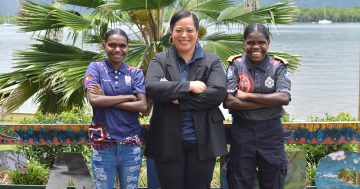Anushika Srivastava* says rather than being a liability, so-called feminine traits give women the edge when it comes to leadership.

Image: Jirsak
According to a Committee of 200 report, women’s empathetic attitude is a positive trait and it helps them interpret situations differently than men.
Though our society places men at the top of the social and familial hierarchy, women have always been known to incorporate the essence of unity.
In fact, a recent study published in Harvard Business Review shows that women are actually better at leading diverse countries than men.
Women are known to believe in strengthening relationships.
This quality helps them strengthen industry collaborations.
They are not only known to be goal-oriented but also align the process with principles and values.
Studies show that empathy helps women interpret situations differently than men.
However, stereotypical beliefs often lead society at large to dismiss women as emotional and sentimental, thus not possessing the right qualities to hold a leadership positions.
But these character traits can in fact come in handy to an organisation.
Sunita Wazir, Wellbeing and Inclusion Lead at Hindustan Unilever Limited (HUL), believes women are naturally inclusive and can bring a balance instinctively.
“This stems from the basic physiological difference in gender response to stress or threat — the ability to pull from ‘flight or fight’ to ‘tend and befriend’ when faced with aggression,” she says.
“A woman will usually look for ways to ease the situation and will break-down rather than construct walls.”
“She will look for allies and supporters to help resolve both social stress and threats.”
Wazir adds that a woman’s natural tendency to build affiliates or seek social support make her the better choice for accepting and embracing diversity in all forms.
“Women just make the space somehow!” Wazir says.
Archita Srivastava, MBA Professor at Allenhouse College observes: “Most of the time when it comes to finding a solution to the problem, male students immediately come up with answers.”
“Female students on the other hand first ponder upon the possibilities and what effect these will have in the future, and so, I feel, they do prioritise everything collectively.”
“This is like analysing the situation first then analysing its impacts on everyone related to the organisation.”
“And a leader is, after all, known for his or her collective approach towards everything and everyone.”
“So yes, I do feel that women make better leaders than men and that their empathy is something that helps them positively.”
Aligning values, principles and proficiency with strategy
Wazir says the nature versus nurture conversation — that men have better construction capability and are of an engineering mindset by instinct versus women, who are better at creative pursuits — has been going on for generations.
“To me, it’s natural that the woman being the decision-maker and the top buyer in the industry by virtue of managing both careers and household budgets should be equally present in the design stage of any product.”
“And from this follows the entire chain — production, distribution, and advertising to selling.”
“To speak to a buyer, a successful organisation needs the voice of women at every stage.”
“No amount of social conditioning on best roles for men and women can take away from the fact that employers with a gender-balanced workforce will thrive!” she says.
Ashmita Singh, an MBA student at India’s Pranveer Singh Institute of Technology, says: “Women are known to tackle the toughest of situations.”
“As they take care of all the members of the family when being a housewife, they can surely do so when dealing with a range of diverse employees in an organisation.”
“So yes, they do form better leaders on many fronts than men.”
According to Singh, the problem is that women are not given enough chances to prove themselves.
“Without even giving them a chance to prove their potential, we label ‘Men are better at handling organisations than women’.”
“This is the right time to ask: ‘Why?’.”
* Anushika Srivastava writes for She The People. She tweets at @Anushiikaa.
This article first appeared at www.shethepeople.tv.











